动词及动词词组
最常用的18个动词
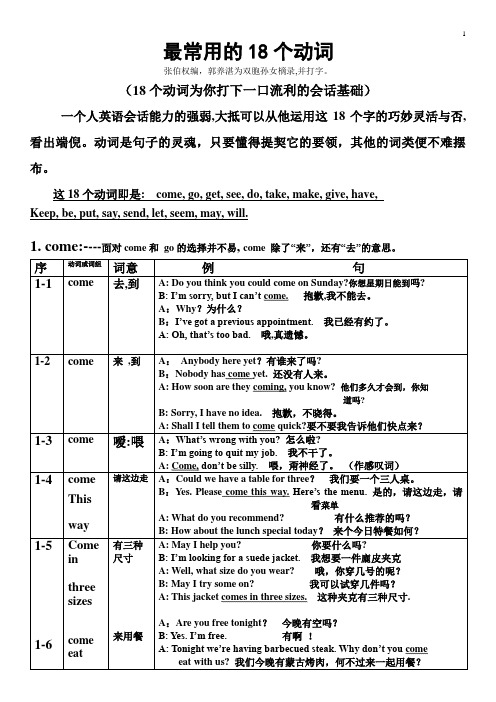
最常用的18个动词张伯权编,郭养湛为双胞孙女樀录,并打字。
(18个动词为你打下一口流利的会话基础)一个人英语会话能力的强弱,大抵可以从他运用这18个字的巧妙灵活与否,看出端倪。
动词是句子的灵魂,只要懂得提契它的要领,其他的词类便不难摆布。
这18个动词即是: come, go, get, see, do, take, make, give, have,Keep, be, put, say, send, let, seem, may, will.e:----面对come和go的选择并不易, come 除了“来”,还有“去”的意思。
2.go------go 有许多不同用法,好像个性活泼的化学元素,不易掌握。
的用法可写一本专书。
Get以口语(spoken language)为舞台,生旦皆行,唱唸俱佳!(get意义很广,如果给它配上不同的付词和介词,几乎可以代表所有英语动词,运用在各个场合以表达人的思想和感情,所以要熟练地掌握get 用法)。
64. see----see 可以是“视而不见”的“视“,也可以是“心里明白”的“明白”,如何拿捏,只有勤学与勤练5. do------do 可作“一般动词”,亦可作“助动词”用,另外还有“强调动词”和“代用动词”的功能,是个既方便又好用的字…..而其最大的特点乃是“简洁有力”。
6.Take-----从“吃饭”到“稍安勿躁”,从“搭车”到“小憩片刻”,都少不了take 这个字。
7.make------一个人英语会话力的强弱,大低可从其运用make巧妙灵活与否看出端倪。
请务必记住它的一些用法。
8.give---熟谙英语的逻辑,可以说是增强英语会话力的秘诀之一,而把give和get的用法搞通,正是达到目标的第一步。
9.have----会话首重“简洁有力”。
Have这个字除了作“有”解,还有许多意思,懂得运用,可使会话达到简洁的效果。
10.keep-----除了borrow 之外,keep 也可当作“借”解,是兼能表达“动作”和“状态”的文武全才动词。
高考常见的动词词组动词词组

1. 动词+aboutcare about 对…在乎come about 发生(vi)bring about 引起,使发生hear about 听说set about doing 着手,开始做think about 思考worry about 为…担心2. 动词+ ataim at 目的是call at 拜访(地点)come atglance at 匆匆一瞥glare at 怒视laugh at 嘲笑knock at 敲(门,窗)point at 指向run at 冲向shoot at 向…射击shout at 冲某人嚷嚷smile at 冲某人微笑stare at 凝视tear at 用力撕wonder at 惊讶work at3. 动词+awayblow away 吹走carry away 拿走,使入迷clear away 消除掉,消散give away 背弃,泄漏pass away 过世put away 收拾起来;存起来take away 拿走throw away 扔掉wash away 冲走4. 动词+backcall back 回电话give back 归还hold back 控制住;踌躇;阻止…发展keep back 隐瞒;忍住;扣下(钱)look back 回顾take back 拿回,收回5. 动词+downbreak down 坏了;垮了;失灵;分解;克服(某种情绪)bring down 使…降低;使...倒下burn down 烧毁come down 下落,传下来calm down 平静下来cut down 消减;坎倒pass down 传下来settle down 安家;安静下来slow down 慢下来take down 记下tear down 拆毁,拆除turn down 调小,拒绝6. 动词+foranswer for 对…负责apply for 申请ask for 要求得到beg for 乞求call for 要求;需要change…for…用…来换charge …for…收费;要价care for 关心;喜欢hunt for 寻找hope/ wish for 希望long for 渴望look for 寻找pay for 为…付钱run for 竞选search for 查找stand for 代表,表示take… for 误以为…是…wait for 等待7. 动词+fromdate from 始于…(=date back to)differ from 与…不同die from 因…而死hear from 收到某人来信keep/ prevent/ stop …from doing阻止learn from 向…学习result from 由于separate… from 把…分离开suffer from 受…苦8. 动词+inbreak in 强行进入;插话bring in 引进;赚得call in 召集;来访cut in 插入drop in 拜访fill in 填写get in 进入;收获give in 让步,投降hand in 上交join in 参加(活动)look in 来访,参观persist in 坚持result in 导致succeed in 成功take in 吸收;理解;欺骗9. 动词+intoburst into 闯入;迸发change ….into…把…变成…divide…into…把…分成…look into 研究;调查put/ translate…into…翻译run into 碰到turn into 变成10. 动词+ofapprove of 赞成complaim of 抱怨consist of 组成die of 死于dream of 梦到hear of 听说rob sb. of 抢劫某人某物speak of 谈到talk of 谈到think of 想到11. 动词+offbreak off 打断carry off 带走cut off 切断;断绝fall off 跌落,掉下get off 脱下;下车give off 散发出go off 走开,消失,坏掉keep off 避开;勿走进knock off 把…撞落leave off 中断,停下pay off 还清put off 延期,推迟see off 送行set off 出发,上路show off 炫耀start off 出发take off 脱下;起飞;腾飞;模仿turn off 关掉;turn sb off 使某人厌烦12. 动词+onbring on 使…发展carry on 继续,进行call on 拜访call on sb to do 号召某人去做congratulation to sb on sth祝贺depend on 依靠feed on 以…为生go on 继续,进行insist on 坚持have on 穿着keep on 继续look on 旁观live on 以…为生move on 继续移动,向前走operate on 给…做手术pass on 传受,传递put on 穿上,戴上,上演rely on 依靠spend…on sth/ in doing 在某方面花钱take on 雇佣;呈现;承担(任务)try on 试穿turn/ switch on 打开work on 从事13. 动词+outbreak out 爆发bring out 阐明burst out 迸发carry out 执行come out 出来;出版;开花drop out 辍学;退出figure out 算出find out 查处give out 散发;分发;用完;劳累go out 熄灭hand out 散发help out 救助hold out 伸出;坚持下去leave out 省略,删掉let out 泄漏,发出(声音)look out 小心keep out 使…不进入make out 理解,看清楚pick out 选出point out 指出put out 扑灭run out 被用完run out of 把…用完set out 出发;开始做to dosend out 发出;派遣speak out 大胆讲出try out 使用,试验turn out 结果是;生产wear out 突破;使…疲劳work out 算出;制定;运行结果;锻炼14. 动词+overget over 克服;恢复go over 复习;审查,研究fall over 跌倒,摔倒look over 翻阅;检查roll over 翻滚run over 看一遍,压死take over 接管think over 仔细考虑turn over 翻倒;细想15. 动词+toadd to 增添add….to…把…增添到…agree to 同意attend to 照料belong to 属于come to 共计;苏醒compare …to…与…相比devote to 致力于get to 到达happen to 发生lead to 导致listen to 听object to 反对point to 指向refer to 谈到;涉及到;参阅reply to 答复see to 处理,照料stick/ hold/ keep to 坚持supply… to 为..提供turn to 查阅;向…求助write to 给某人写信16. 动词+upbreak up 分解,解散bring up 抚养build up 建立catch up with 赶上clear up 整理,收拾;放晴come up 上来;出现cut up 切碎do up 整理,包装eat up 吃完end up 结束fix up 修理;安排,装置get up 起床,站起give up 放弃,停止go up 增长,上涨grow up 成长hurry up 赶快keep up 保持hold up 耽搁,使停顿lay up 积蓄look up 查找,找出make up 组成;编造;铺(床);和好open up 开创pick up 拾起;学会;接某人;接受put up 搭起;住宿;张贴ring up 打电话send up 发射set up 架起;建立sit up 熬夜speed up 加速stay up 熬夜take up 开始做;从事;继续;占据tear up 撕碎throw up 吐turn up 调大;出席,出现use up用完17. 动词+withagree with同意begin with以…开始combine with结合compare…with…对比cover with覆盖deal with处理do with处理end with以…结束equip …with…装备fill with装满play with玩耍provide sb with sth提供provide sth for sb meet with遇到,遭受share with分享supply sb with sth提供supply sth to sb talk with和某人谈话18. 动词+throughget through通过;完成;接通电话go through审查,检查live through经历look through翻阅,仔细察看pull through渡过危机see through识破动词+名次+介词catch sight of 瞧见,看见catch/ take hold of 抓住devote oneself to 致力于do harm to 对…有危害do wrong to 冤枉,委屈feel/ have/ take pity for 同情fix one’s eyes on 凝视form the habit of 养成习惯get in touch of 联系上get rid of 去除give advice on 提出建议have trust in 相信have (no)difficulty in (没)有困难have a word with 同某人谈话have words with 和某人争吵have a look at 看have/ show/ feel/ (an)interest in对某物感兴趣have effect on 对…有影响have mercy on 同情怜悯have the honor of 有…的荣幸help oneself to自便keep in touch with 保持联系make friends with 交朋友make fun of 取笑make good/ full use of 利用make (the) best use of 充分利用make an apology to 道歉make a fool of 愚弄make one’s way to 走向make preparations for 为.. 做准备make room for 为…留地方pay a visit to 访问pay attention to 注意put one’s heart to 全神贯注于set fire to=set sth on fire 点火show respect for 尊敬say hello/ goodbye to 打招呼/道别set an example to 树立榜样shake hands with 握手take aim at 瞄准take charge of 负责管理take the side of 支持take pride in 因…而自豪take part in 参加take a photo of 照相take a message for 捎个口信take care of照顾take notice of注意take the place of代替throw light on 阐明动词+副词/形容词+介词add up to 总计为break away from 脱离,挣脱be up to 应由…轮到…cut down on 消减catch up with 赶上come up to 达到(标准)come up against 遭到(反对,困难)do well in 做得好do away with 废除drop in on/ at 拜访人/地face up to 面对,承担fit in with 适合,符合get down to 开始认真做get close to 接近get into the habit of养成习惯get used to 习惯get on/ along with 进展,相处get out of 从…出来,摆脱go on with 继续go back on 背信,背弃go in for 参加,爱好keep away from 远离keep up with 跟上live up to 不辜负look/ watch out for 小心look back upon 回顾look forward to 期待look up to 尊敬look down upon 轻视make up for 弥补put up with 忍受think highly of 高度评价work hard at 努力于动词+介词+名词arrive at/ come to aconclusion得出结论burst into pieces 成为碎片burst into laughter/ tears 突然大笑/大哭come into use 开始使用come into power 当权coem into being 产生do up one’s hair 梳理头发get in a word 插话make up one’s mind 下决心。
6专题六 动词与动词词组
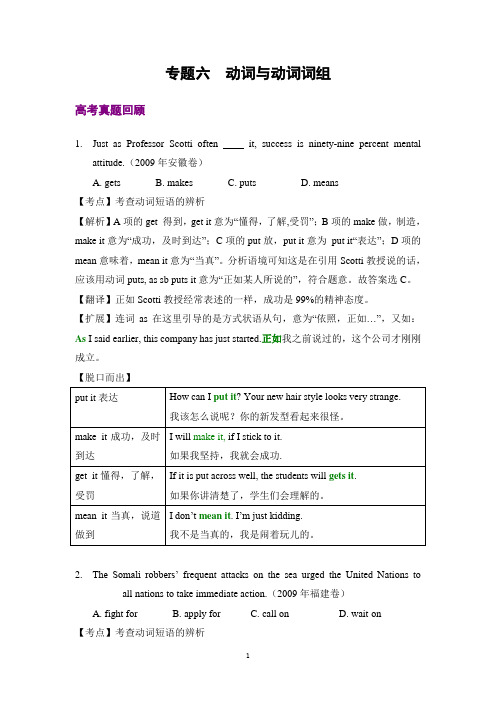
专题六动词与动词词组高考真题回顾1.Just as Professor Scotti often it, success is ninety-nine percent mentalattitude.(2009年安徽卷)A. getsB. makesC. putsD. means【考点】考查动词短语的辨析【解析】A项的get 得到,get it意为“懂得,了解,受罚”;B项的make做,制造,make it意为“成功,及时到达”;C项的put放,put it意为put it“表达”;D项的mean意味着,mean it意为“当真”。
分析语境可知这是在引用Scotti教授说的话,应该用动词puts, as sb puts it意为“正如某人所说的”,符合题意。
故答案选C。
【翻译】正如Scotti教授经常表述的一样,成功是99%的精神态度。
【扩展】连词as在这里引导的是方式状语从句,意为“依照,正如…”,又如:As I said earlier, this company has just started.正如我之前说过的,这个公司才刚刚成立。
【脱口而出】2.The Somali robbers’frequent attacks on the sea urged the United Nations to______all nations to take immediate action.(2009年福建卷)A. fight forB. apply forC. call onD. wait on【考点】考查动词短语的辨析【解析】fight for 意为“与……做斗争;为……而战”;apply for 意为“申请”;call on 意为“拜访(人);号召”;wait for 意为“等待,伺候,服伺”。
经分析可知,只有选项C 符合句意。
【翻译】索马里海盗在海上频繁的抢劫促使联合国号召所有国家立即采取行动。
英语常见动词词组固定搭配

高中英语动词、形容词词组固定搭配一、接不定式(而不接动名词)作宾语的24个常用动词:afford to do sth. 负担得起做某事 agree to do sth. 同意做某事arrange to do sth.安排做某事 ask to do sth. 要求做某事beg to do sth. 请求做某事 care to do sth. 想要做某事choose to do sth. 决定做某事 decide to do sth. 决定做某事demand to do sth. 要求做某事 determine to do sth. 决心做某事expect to do sth. 期待做某事 fear to do sth. 害怕做某事help to do sth. 帮助做某事 hope to do sth. 希望做某事learn to do sth. 学习做某事 manage to do sth. 设法做某事offer to do sth. 主动提出做某事 plan to do sth. 计划做某事prepare to do sth. 准备做某事 pretend to do sth. 假装做某事promise to do sth. 答应做某事 refuse to do sth. 拒绝做某事want to do sth. 想要做某事 wish to do sth. 希望做某事aim to do sth. 打算做某事 fail to do sth. 未能做某事long to do sth. 渴望做某事 happen to do sth. 碰巧做某事hesitate to do sth. 犹豫做某事 struggle to do sth. 努力做某事二、接不定式作宾补的36个常用动词:advise sb. to do sth. 建议某人做某事allow sb. to do sth. 允许某人做某事ask sb. to do sth.请(叫)某人做某事bear sb. to do sth.忍受某人做某事cause sb. to do sth. 导致某人做某事command sb. to do sth. 命令某人做某事drive sb. to do sth .驱使某人做某事elect sb. to do sth. 选举某人做某事encourage sb. to do sth. 鼓励某人做某事expect sb. to do sth. 期望某人做某事forbid sb. to do sth. 禁止某人做某事force sb. to do sth. 强迫某人做某事get sb. to do sth. 使(要)某人做某事hate sb. to do sth. 讨厌某人做某事help sb. to do sth. 帮助某人做某事intend sb. to do sth. 打算要某人做某事invite sb. to do sth. 邀请某人做某事leave sb. to do sth. 留下某人做某事like sb. to do sth. 喜欢某人做某事mean sb. to do sth. 打算要某人做某事need sb. to do sth. 需要某人做某事oblige sb. to do sth. 迫使某人做某事order sb. to do sth. 命令某人做某事permit sb. to do sth. 允许某人做某事persuade sb. to do sth. 说服某人做某事request sb. to do sth. 要求某人做某事remind sb. to do sth. 提醒某人做某事teach sb. to do sth .教某人做某事tell sb. to do sth. 告诉某人做某事train sb. to do sth. 训练某人做某事trouble sb. to do sth. 麻烦某人做某事want sb. to do sth. 想要某人做某事warn sb. to do sth. 警告某人做某事wish sb. to do sth. 希望某人做某事三、接动名词(不接不定式)作宾语的34个常用动词:admit doing sth. 承认做某事 advise doing sth. 建议做某事allow doing sth. 允许做某事 appreciate doing sth. 感激做某事avoid doing sth. 避免做某事 consider doing sth. 考虑做某事delay doing sth. 推迟做某事 deny doing sth. 否认做某事discuss doing sth. 讨论做某事 dislike doing sth. 不喜欢做某事enjoy doing sth. 喜爱做某事 escape doing sth. 逃脱做某事excuse doing sth. 原谅做某事 fancy doing sth. 设想做某事finish doing sth. 完成做某事 forbid doing sth. 禁止做某事forgive doing sth. 原谅做某事 give up doing sth. 放弃做某事imagine doing sth. 想象做某事 keep doing sth. 保持做某事mention doing sth. 提及做某事 mind doing sth. 介意做某事miss doing sth. 错过做某事 pardon doing sth. 原谅做某事 permit doing sth. 允许做某事 practice doing sth. 练习做某事prevent doing sth. 阻止做某事 prohibit doing sth. 禁止做某事put off doing sth. 推迟做某事 report doing sth. 报告做某事risk doing sth. 冒险做某事 stop doing sth. 停止做某事suggest doing sth. 建议做事 understand doing sth. 理解做某事四、接现在分词作宾补的20个常用动词:bring sb. doing sth.引起某人做某事catch sb. doing sth. 碰上(撞上)某人做某事discover sb. doing sth. 发现某人做某事feel sb. doing sth. 感觉某人做某事find sb. doing sth. 碰上(撞上)某人做某事get sb. doing sth. 使某人做某事have sb. doing sth. 使某人做某事hear sb. doing sth. 听见某人做某事keep sb. doing sth. 使某人不停地做某事listen to sb. doing sth. 听某人做某事look at sb. doing sth. 看着某人做某事notice sb. doing sth. 注意到某人做某事observe sb. doing sth. 观察某人做某事prevent sb. doing sth. 阻止某人做某事see sb. doing sth. 看见某人做某事send sb. doing sth.使某人(突然)做某事set sb. doing sth. 使(引起)某人做某事start sb. doing sth. 使某人开始做某事stop sb. doing sth. 阻止某人做某事watch sb. doing sth. 观看某人做某事五、接动词原形作宾补的11个常用动词:feel sb. do sth. 感觉某人做某事have sb. do sth. 使某人做某事hear sb. do sth. 听见某人做某事let sb. do sth.让某人做某事listen to sb. do sth. 听着某人做某事look at sb. do sth. 看着某人做某事make sb. do sth. 使某人做某事notice sb. do sth. 注意某人做某事observe sb. do sth. 观察某人做某事see sb. do sth. 看见某人做某事watch sb. do sth. 观察某人做某事察某人做某事六、接不定式或动名词作宾语意思相同的12个动词:like to do sth / like doing sth. 喜欢做某事love to do sth / love doing sth. 喜欢做某事hate to do sth / hate doing sth. 憎恨做某事prefer to do sth / prefer doing sth. 宁可做某事begin to do sth / begin doing sth. 开始做某事start to do sth / start doing sth. 开始做某事continue to do sth / continue doing sth. 继续做某事can’t bear to do sth / can’ t bear doing sth. 不能忍受做某事 bother to do sth / bother doing sth. 麻烦做某事intend to do sth / intend doing sth.想要做某事attempt to do sth / attempt doing sth. 试图做某事cease to do sth / cease doing sth. 停止做某事七、接不定式或动名词作宾语意思不同的7个动词(1) remember to do sth. 记住要做某事remember doing sth. 记住曾做过某事(2) forget to do sth. 忘记要做某事forget doing sth. 忘记曾做过某事(3) regret to do sth. 后悔(遗憾)要做某事regret doing sth. 后悔(遗憾)曾做过某事(4) try to do sth. 设法要做某事try doing sth. 做某事试试看有何效果(5) mean to do sth. 打算做某事mean doing sth. 意味着做某事(6) can’t help to do sth. 不能帮助做某事can’t help doing sth. 禁不住做某事(7) go on to do sth. 做完某事后接着做另一事go on doing sth. 继续做一直在做的事注:stop to do sth. 与stop doing sth.也不同,前者指停下来去做某事,后者指停止正在做的事,但stop to do sth. 中的不定式不是宾语,是目的状语。
高考英语常用动词词组
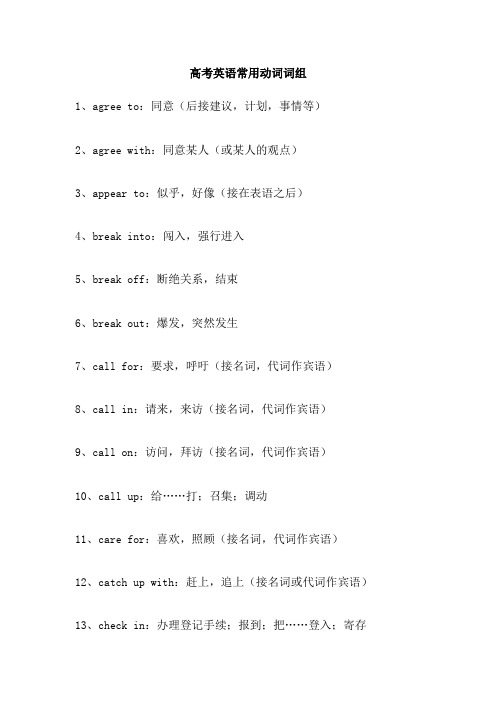
高考英语常用动词词组1、agree to:同意(后接建议,计划,事情等)2、agree with:同意某人(或某人的观点)3、appear to:似乎,好像(接在表语之后)4、break into:闯入,强行进入5、break off:断绝关系,结束6、break out:爆发,突然发生7、call for:要求,呼吁(接名词,代词作宾语)8、call in:请来,来访(接名词,代词作宾语)9、call on:访问,拜访(接名词,代词作宾语)10、call up:给……打;召集;调动11、care for:喜欢,照顾(接名词,代词作宾语)12、catch up with:赶上,追上(接名词或代词作宾语)13、check in:办理登记手续;报到;把……登入;寄存14、check out:结账离开;办妥手续离开;核对无误;核实;查证15、choose from:从……选择16、come across:偶然遇到;发现;处理;从……中获得;涉及到。
高考英语高频动词词组在高考英语考试中,动词词组的掌握是非常重要的。
下面是一些高频的动词词组,希望对考生们有所帮助。
1、look up查阅,查询2、look down低头看,俯视3、look back回顾,回忆4、look forward to期待,盼望5、look into调查,研究6、look out注意,小心7、look over检查,查看8、look through浏览,仔细查看9、take off起飞,脱掉10、take on承担,呈现11、take up开始从事,占据12、take off for动身去某地13、take in吸收,理解14、take over接管,接任15、take out取出,去掉16、take care当心,注意17、take care of注意照顾18、give up放弃,投降19、give in让步,屈服20、give off发出,放出21、give out分发,公布22、put up张贴,搭建23、put down放下,记下24、put away放好,收起25、put off推迟,取消26、put on上演,穿上27、call up打,召集28、call in请假,召来29、call out大声叫喊30、call off取消,放弃31、set up建立,搭建32、set out动身,出发33、set down记下,放下34、set off出发,动身35、get up起床,筹备36、get in进入,收获37、get out出去,发布出去’除了上述这些词组外,还有许多其他的动词词组在高考英语中也会经常出现。
英语翻译常用动词词组 -

英语翻译常用动词和动词词组II. 常用分类动宾词组一、政治类:1. 日益昌盛 become increasingly prosperous2. 快速发展 develop rapidly3. 隆重集会 gather ceremoniously4. 热爱和平 love peace5. 追求进步 pursue progress6. 履行权利和义务 perform the responsibilities and obligations7. 回顾奋斗历程 review the course of struggle8. 展望伟大征程 look into the great journey9. 充满信心和力量be filled with confidence and strength10. 必胜 be bound to win11. 主张各国政府采取行动 urge governments of all countries to take action12. 和平共处 coexist peacefully13. 对内开放和对外开放 open up both externally and internally14. 经历两个不同时期experience two different periods15. 战胜无数的困难 overcome numerous difficulties16. 赢得一个又一个胜利 win one victory after another17. 完全意识到 be fully aware that18. 迈出重要的一步 make an important step19. 采取各种措施 adopt various measures20. 得出结论 ,告一段落 draw ( arrive at, come to reach ) a conclusion21. 实现民族独立 realize national independence22. 追求真理 seek the truth23. 建立社会主义制度 establish a socialist system24. 根除(防止,消除)腐败root out (prevent, eliminate) corruption25. 响应号召 respond to the call26. 进入新时期 enter a new period27. 实行新政策 practice new policies28. 展现生机和活力 display one’s vigor and vitality29. 增强综合国力enhance comprehensive(overall) national strength and和国际竟争力 international competitiveness30. 进入世界先进行列 edge into the advanced ranks in the world31. 解决温饱问题solve the problem of food and clothing32. 吸收各国文明的先进成果 absorb what is advanced in other civilizations33. 与日俱增 increase every day34. 实现夙愿 fulfill the long-cherished wishes35. 必将实现 be bound to come true 36. 锻造一支人民军队 forge a people’s army37. 建立巩固的国防 build a strong national defense38. 进行和谈 hold peace talks39. 修改法律 amend the laws40. 在...中起(至关)重要作用play a major (crucial, an important ) role in41. 对...做出重要(巨大)贡献make important (great, major )contributions to42. 遵循规则 follow the principles43. 把理论和实际结合起来integrate theory with practice …44. 把...作为指导 take… as the guide45. 缓和紧张状况 ease the tension46. 高举伟大旗帜 hold high the great banner47. 解决新问题 resolve new problems48. 观察当今世界 observe the present-day world49. 开拓前进 open up new ways forward50. 增强凝聚力 enhance the rally power51. 结束暴力,开始和平谈判end the violence and resume peace talks52. 进行战略性调整 make strategic readjustment53. 开始生效 go into effect / enter into force54. 就...接受妥协 accept a compromise on55. 接受...的采访 be interviewed by56. 把……看成社会公敌 look upon … as a threat to society57. 把……捐给慈善机构 donate …to charities58. 维护世界和平 maintain world peace59. 摆脱贫穷落后 get rid of poverty and backwardness60. 实现发展繁荣bring about development and prosperity61. 反对各种形式的恐怖主义 be opposed to all forms of terrorism62. 宣布。
高考短语资料——40个高考英语必备动词及词组讲解
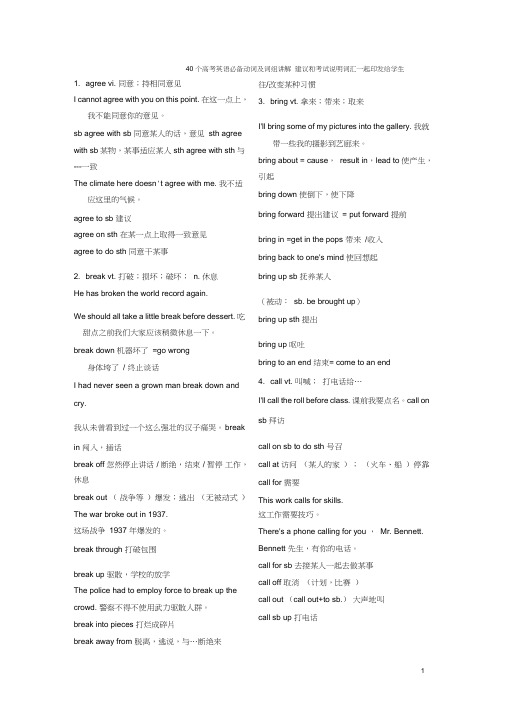
40 个高考英语必备动词及词组讲解建议和考试说明词汇一起印发给学生1. agree vi. 同意;持相同意见I cannot agree with you on this point. 在这一点上,我不能同意你的意见。
sb agree with sb 同意某人的话,意见sth agree with sb 某物,某事适应某人sth agree with sth 与---一致The climate here doesn't agree with me. 我不适应这里的气候。
agree to sb 建议agree on sth 在某一点上取得一致意见agree to do sth 同意干某事2. break vt. 打破;损坏;破坏;n. 休息He has broken the world record again.We should all take a little break before dessert. 吃甜点之前我们大家应该稍微休息一下。
break down 机器坏了=go wrong身体垮了/ 终止谈话I had never seen a grown man break down and cry.我从未曾看到过一个这么强壮的汉子痛哭。
break in 闯入,插话break off 忽然停止讲话/ 断绝,结束/ 暂停工作,休息break out (战争等)爆发;逃出(无被动式)The war broke out in 1937.这场战争1937 年爆发的。
break through 打破包围break up 驱散,学校的放学The police had to employ force to break up the crowd. 警察不得不使用武力驱散人群。
break into pieces 打烂成碎片break away from 脱离,逃说,与…断绝来往/改变某种习惯3. bring vt. 拿来;带来;取来I'll bring some of my pictures into the gallery. 我就带一些我的摄影到艺廊来。
英语动词及动词短语

动词短语 4.动词+over构成的短语:
e over 2.hand over 3.go over 4.get over 5.look over 6.think over 7.take over 8.turn over
1.过来 2.移交 3.仔细检查,复习 4.克服,恢复 5.检查 6.仔细考虑 7.接受,接管 8.翻转
2.put back 2.把---放回原处
3.put down 3.放下,镇压
4.put forward 4.提出,建议
5.put in
5.放进
6.put off
6.推迟,拖延
7.put on
7.穿上,戴上,增加,上演
8.put out 9.put up
8.扑灭;熄灭 9.举起,张贴
19.be/get/become +过去分词/形容词+介词的短语有:
1.cut in
1.插嘴,插入
2.cut across 2.抄近路
3.cut off
3.切断
4.cut up
4.切碎
5.cut down 5.砍倒,削减
6.cut out 6.切掉,裁剪出
动词短语 12.get +介词/副词的短语:
1.get through 1.通过,度过,打通
2.get in
2.进入,陷入
5.动词+up构成的短语:
1.bring up 2.call up e up 4.cut up 5.fix up 6.give up 7.go up 8.grow up 9.look up 10.make up 11.put up 12.pick up 13.set up 14.send up 15.show up 16.turn up 17.take up
高考英语词法系列:动词和动词短语
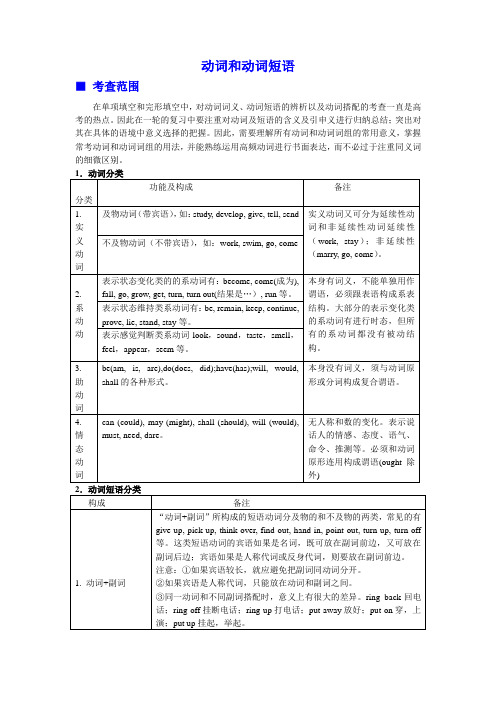
动词和动词短语■考查范围在单项填空和完形填空中,对动词词义、动词短语的辨析以及动词搭配的考查一直是高考的热点。
因此在一轮的复习中要注重对动词及短语的含义及引申义进行归纳总结;突出对其在具体的语境中意义选择的把握。
因此,需要理解所有动词和动词词组的常用意义,掌握常考动词和动词词组的用法,并能熟练运用高频动词进行书面表达,而不必过于注重同义词的细微区别。
■高频考点高考对动词的考查重点集中在实义动词的常见意义和用法,而对助动词的考查较少。
对动词短语的考查重点是第1~3项,而考查第4~6项的情况较少。
高考试题分析■真题探究1.(2010安徽)No matter how low you consider yourself, there is always someone ______you wishing they were that highA. getting rid ofB. getting along withC. Looking up toD. looking down upon【答案与解析】C getting rid of意为“摆脱;去除”;getting along with意为“与……相处;进展”;Looking up to意为“尊敬;敬仰”;looking down upon意为“看不起;轻视”。
句意为“你无论认为自己怎样低下, 总希望有个高尚的人来尊敬你。
”2. (2010全国Ⅰ)The workers ______ the glasses and marked on each box “ This Side Up”A. carriedB. deliveredC. pressedD. packed【答案与解析】D 句意:工人们把玻璃制品包装好并且每个盒子上标记上“此面向上”。
选项为四个意思上毫无关联的动词, 此题考查动词的词义辨析。
carry 译为搬运, deliver译为递送, press译为按, 压, pack译为打包。
动词与动词短语

第四讲动词和动词短语考点一动词的分类1,及物动词:可直接加宾语。
如:do, hate, like, marry, say, tell.2,不及物动词:加适当的介词后再加宾语。
如:come, go, arrive3,助动词:have (has, had),do (did, does)4,可接双宾语的动词如: show, buy, sell, offer, make, teach, award等,其用法为:1,动词+间宾(人)+直宾(物)buy me a book.2,动词+直宾+for(为)+间宾buy a book for me.3,动词+直宾+to(方向)+间宾show the book to me.5, 系动词:be (am, is, are, was, were)除be动词外,还有些动词可以用作连系动词,它们不能单独作谓语,必须与表语(多为形容词)一起构成合成谓语。
【对点演练】一. 单句语法填空,根据汉语提示完成句子。
1.You know how I ____(讨厌)math.2.He _________(进入)the room and shut the door.3.Do you ____(助动词)something to eat?4.He is saving up to buy a house ____(介词) his family.5.He ___(系动词) staying with friends this weekend.答案:1 hate 2came into 3have 4for 5is二. 单句语法改错1.Now I like to the film some.2.Will you go us? Sure!3.Love me as I love you?4.Do not expect him to show kindness for you.5.I will brain you if you don't keep quietly.答案:1去掉to 2 go后面加with 3Love前面加Do,且Love改love 4for改to 5quietly改quiet考点二动词辨析1. 重点掌握某些近义词的辨析如:admit, allow, permit; contain, include; receive, accept; want, wish, hope, expect; stay, remain, keep; discover, uncover等。
高中英语语法过关辅导课件-动词和动词词组

She went through the book before buying it. She went over the lessons for three times. He had to go without food. The ship is heading for the nearest port. He is looking up a new word in the dictionary. The boy looked through the picture book. She put up a picture on the wall. The match is put off owing to the rain. The bus ran over his legs. His illness results from overeating. Overeating results in his illness.
You will answer for what you’ve done. The boy asked for more food. He doesn’t care for playing football. I came across an old friend in the street.
call up打电话
到进一步发展,不能与名词purpose搭配使用。obtain“获得,得
到”,多指获得信息、知识、忠告、许可等,不能与purpose搭配。 reach“达到,达成”,在此最具迷惑性,但reach多与conclusion,
decision, agreement, destination等名词搭配,不能与purpose搭配。
sth.“因某事而控告某人”。blame“责备,责怪”,常与介词for
常见词组搭配及动词词组搭配

常见词组搭配及动词词组搭配一、词组搭配1、balance between平衡;2、difference between 差异;3、link between 联系;4、ambition for 雄心, 抱负, 野心;5、sympathy for 对....的同情;6、confidence in 对....有信心;7、belief in 相信;believe in 相信;8、success in 成功succeed in;9、dependence on 依赖于depend on 动词形式;10、emphasis on 强调;11、impact on 对...的影响, 对...的冲击;12、influence on 影响;13、pressure on 对...有压力;14、stress on强调, 重视;15、advantage over优越于;16、have/gain access to 接近, 使用;17、attention to 注意;18、attitude to 态度, 看法;19、exposure to 动词:expose to 暴露于, 曝光于。
20、(in) response to 相应;21、(in) accordance with 与....保持一致;22、association with\ associate with 与....有关;23、combination with \combine with 同....结合24、compromise with 放弃, 妥协;25、contact with 与....接触, 联系;26、encounter with与....相遇二、动词词组固定搭配1、Break的搭配:Break out (战争、打斗等不愉快事件)突然发生,爆发;Break down 损坏,拆散,失败;Break in 非法闯入;插话;Break through 突破,突围;Break off 中断,中止2、bring 和come的搭配:bring about 导致,造成,引起,产生;come about发生;bring back 带回,还回,使想起;Bring out 使出版;出现,呈现= arise;Come out 出现,出版,显现;Bring up 提出、教育,养育;come up 出现;come upwith 提出...想法;come upagainst 遭到....反对;Bringdown 1、减少,降低,2、打败,击垮;Bring forward 提出;Bring off 成功完成….;come across= run into= happen to meet = encounter 偶然相遇;come to 共计。
动词及动词词组考点透析
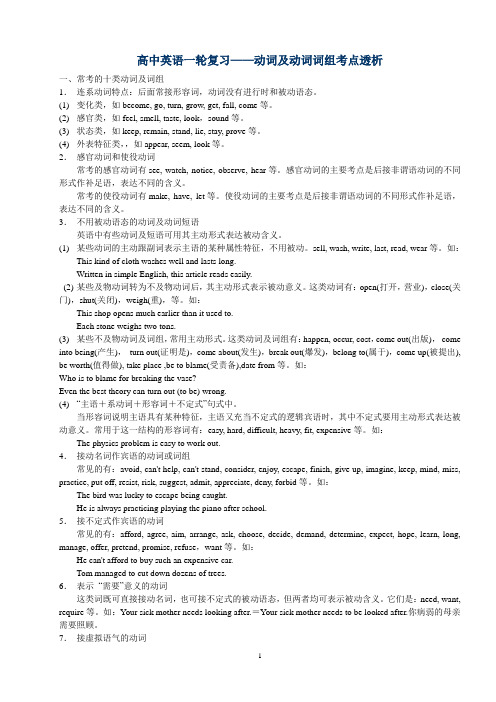
高中英语一轮复习——动词及动词词组考点透析一、常考的十类动词及词组1.连系动词特点:后面常接形容词,动词没有进行时和被动语态。
(1) 变化类,如become, go, turn, grow, get, fall, come等。
(2) 感官类,如feel, smell, taste, look,sound等。
(3) 状态类,如keep, remain, stand, lie, stay, prove等。
(4) 外表特征类,,如appear, seem, look等。
2.感官动词和使役动词常考的感官动词有see, watch, notice, observe, hear等。
感官动词的主要考点是后接非谓语动词的不同形式作补足语,表达不同的含义。
常考的使役动词有make, have, let等。
使役动词的主要考点是后接非谓语动词的不同形式作补足语,表达不同的含义。
3.不用被动语态的动词及动词短语英语中有些动词及短语可用其主动形式表达被动含义。
(1) 某些动词的主动跟副词表示主语的某种属性特征,不用被动。
sell, wash, write, last, read, wear等。
如:This kind of cloth washes well and lasts long.Written in simple English, this article reads easily.(2) 某些及物动词转为不及物动词后,其主动形式表示被动意义。
这类动词有:open(打开,营业),close(关门),shut(关闭),weigh(重),等。
如:This shop opens much earlier than it used to.Each stone weighs two tons.(3) 某些不及物动词及词组,常用主动形式。
这类动词及词组有:happen, occur, cost,come out(出版),come into being(产生),turn out(证明是),come about(发生),break out(爆发),belong to(属于),come up(被提出), be worth(值得做), take place ,be to blame(受责备),date from等。
初中英语常用动词词组及短语240个
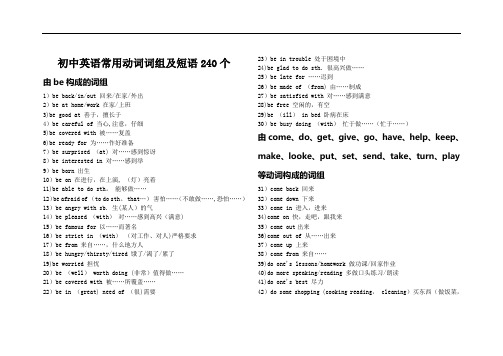
初中英语常用动词词组及短语240个由be构成的词组1)be back/in/out 回来/在家/外出2)be at home/work 在家/上班3)be good at 善于,擅长于4)be careful of 当心,注意,仔细5)be covered with 被……复盖6)be ready for 为……作好准备7)be surprised (at) 对……感到惊讶8)be interested in 对……感到举9)be born 出生10)be on 在进行,在上演, (灯)亮着11)be able to do sth。
能够做……12)be afraid of (to do sth。
that…)害怕……(不敢做……,恐怕……)13)be angry with sb. 生(某人)的气14)be pleased (with)对……感到高兴(满意)15)be famous for 以……而著名16)be strict in (with)(对工作、对人)严格要求17)be from 来自……,什么地方人18)be hungry/thirsty/tired 饿了/渴了/累了19)be worried 担忧20)be (well) worth doing (非常)值得做……21)be covered with 被……所覆盖……22)be in (great) need of (很)需要23)be in trouble 处于困境中24)be glad to do sth. 很高兴做……25)be late for ……迟到26)be made of (from) 由……制成27)be satisfied with 对……感到满意28)be free 空闲的,有空29)be (ill) in bed 卧病在床30)be busy doing (with)忙于做……(忙于……)由come、do、get、give、go、have、help、keep、make、looke、put、set、send、take、turn、play 等动词构成的词组31)come back 回来32)come down 下来33)come in 进入,进来34)come on 快,走吧,跟我来35)come out出来36)come out of 从……出来37)come up 上来38)come from 来自……39)do one's lessons/homework 做功课/回家作业40)do more speaking/reading 多做口头练习/朗读41)do one's best 尽力42)do some shopping (cooking reading, cleaning)买东西(做饭菜,读点书,大扫除)43)do a good deed (good deeds)做一件好事(做好事)44)do morning exercises 做早操45)do eye exercises 做眼保健操46)do well in 在……某方面干得好47)get up 起床48)get everything ready 把一切都准备好49)get ready for (=be ready for)为……作好准备50)get on (well) with 与……相处(融洽)51)get back 返回52)get rid of 除掉,去除53)get in 进入,收集54)get on/off 上/下车55)get to 到达56)get there 到达那里57)give sb。
中考英语动词分类及动词短语
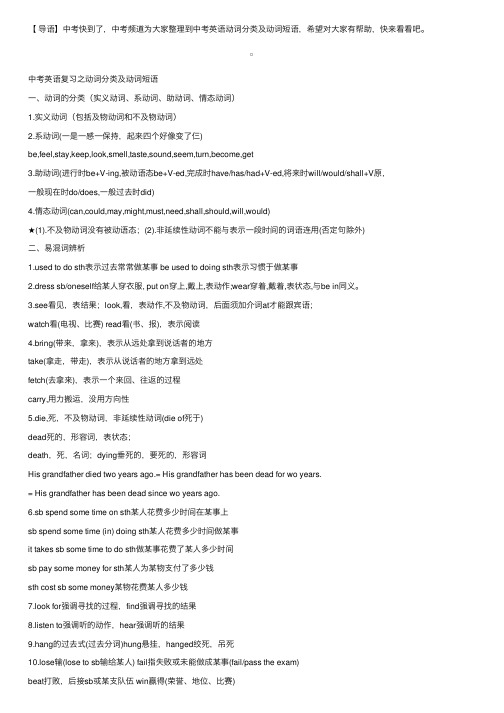
【导语】中考快到了,中考频道为⼤家整理到中考英语动词分类及动词短语,希望对⼤家有帮助,快来看看吧。
中考英语复习之动词分类及动词短语⼀、动词的分类(实义动词、系动词、助动词、情态动词)1.实义动词(包括及物动词和不及物动词)2.系动词(⼀是⼀感⼀保持,起来四个好像变了仨)be,feel,stay,keep,look,smell,taste,sound,seem,turn,become,get3.助动词(进⾏时be+V-ing,被动语态be+V-ed,完成时have/has/had+V-ed,将来时will/would/shall+V原,⼀般现在时do/does,⼀般过去时did)4.情态动词(can,could,may,might,must,need,shall,should,will,would)★(1).不及物动词没有被动语态;(2).⾮延续性动词不能与表⽰⼀段时间的词语连⽤(否定句除外)⼆、易混词辨析ed to do sth表⽰过去常常做某事 be used to doing sth表⽰习惯于做某事2.dress sb/oneself给某⼈穿⾐服, put on穿上,戴上,表动作;wear穿着,戴着,表状态,与be in同义。
3.see看见,表结果;look,看,表动作,不及物动词,后⾯须加介词at才能跟宾语;watch看(电视、⽐赛) read看(书、报),表⽰阅读4.bring(带来,拿来),表⽰从远处拿到说话者的地⽅take(拿⾛,带⾛),表⽰从说话者的地⽅拿到远处fetch(去拿来),表⽰⼀个来回、往返的过程carry,⽤⼒搬运,没⽤⽅向性5.die,死,不及物动词,⾮延续性动词(die of死于)dead死的,形容词,表状态;death,死,名词;dying垂死的,要死的,形容词His grandfather died two years ago.= His grandfather has been dead for wo years.= His grandfather has been dead since wo years ago.6.sb spend some time on sth某⼈花费多少时间在某事上sb spend some time (in) doing sth某⼈花费多少时间做某事it takes sb some time to do sth做某事花费了某⼈多少时间sb pay some money for sth某⼈为某物⽀付了多少钱sth cost sb some money某物花费某⼈多少钱7.look for强调寻找的过程,find强调寻找的结果8.listen to强调听的动作,hear强调听的结果9.hang的过去式(过去分词)hung悬挂,hanged绞死,吊死10.lose输(lose to sb输给某⼈) fail指失败或未能做成某事(fail/pass the exam)beat打败,后接sb或某⽀队伍 win赢得(荣誉、地位、⽐赛)11.lose丢失,失去;forget忘记(forget to do sth 忘记去做某事,forget doing sth 忘记做过某事)leave sth +地点(吧某物落在某地)12.think of想到,认为;think about考虑;think over仔细考虑,反复思考13.may be(可能是)为情态动词加原形表⽰推测,在句中做谓语;maybe (⼤概,也许)为副词,相当于perhaps,⽤于句⾸My father may be at home now.= Maybe my father is at home now.三、常见的动词短语1.look for寻找, look after照顾, look forward to doing sth渴望做某事, look at看着,look up抬头看,查找,look like看起来像,look through浏览,look out当⼼2.put off推迟,put on穿上,上演,put away把…收起来,put up举起,建造,张贴,put out扑灭,put down写下,放下3. turn down把⾳量开⼩⼀点;拒绝;turn up把⾳量开⼤⼀点;出现,turn over翻开;翻转,,turn on 打开(电灯等) turn off 关(电灯等)4.be friendly/kind to对…友好,be different from与…不同,be afraid of害怕,be popular with受…欢迎,be interested in对…感兴趣,be surprised at对…惊讶,be proud of(take pride in)对…感到⾃豪,be strict with sb对某⼈严格,be strict in sth 对某事严格, be good at擅长,be sure of/about对…有把握,be made up of由…构成,be angry with sb对某⼈⽣⽓;be busy with sth忙于;be full of/filled with装满了,be late for…迟到,be covered with覆盖着be famous/known for因…;be famous/known as作为…有名5.get on/along (well) with与某⼈相处(融洽),在…进展(顺利),get up起床,get on上车(船、飞机),get off下车get home到家,get out (of) (从…)出去,get to到达get together聚会,get over克服,get used to习惯于6.take off(飞机)起飞,脱掉(⾐服),take away拿⾛;take out取出,take up占据时间、空间,开始从事,拿起,take photos 照相,take one's place= take the place of sb坐某⼈的座位;代替某⼈的职务 take a seat就坐take a shower淋浴,洗澡take care of照顾 take care⼩⼼,当⼼take one’s temperature量体温 take part in参与,参加 take it easy别着急,慢慢来7.agree with sb同意某⼈agree to do sth同意做某事8.pick up拾起,捡起,拿起,收听,⽤车接送客⼈、货物,收拾、整理;pick out挑选。
高考英语常考动词与动词短语总结
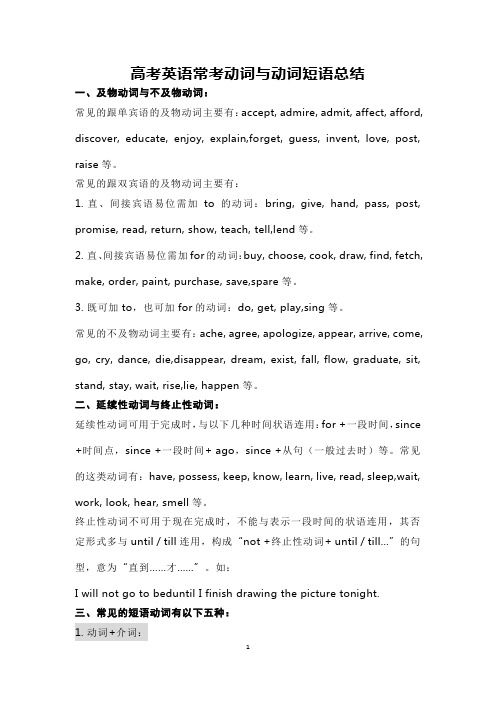
高考英语常考动词与动词短语总结一、及物动词与不及物动词:常见的跟单宾语的及物动词主要有:accept, admire, admit, affect, afford, discover, educate, enjoy, explain,forget, guess, invent, love, post, raise等。
常见的跟双宾语的及物动词主要有:1. 直、间接宾语易位需加to的动词:bring, give, hand, pass, post, promise, read, return, show, teach, tell,lend等。
2. 直、间接宾语易位需加for的动词:buy, choose, cook, draw, find, fetch, make, order, paint, purchase, save,spare等。
3. 既可加to,也可加for的动词:do, get, play,sing等。
常见的不及物动词主要有:ache, agree, apologize, appear, arrive, come, go, cry, dance, die,disappear, dream, exist, fall, flow, graduate, sit, stand, stay, wait, rise,lie, happen等。
二、延续性动词与终止性动词:延续性动词可用于完成时,与以下几种时间状语连用:for +一段时间,since +时间点,since +一段时间+ ago,since +从句(一般过去时)等。
常见的这类动词有:have, possess, keep, know, learn, live, read, sleep,wait, work, look, hear, smell等。
终止性动词不可用于现在完成时,不能与表示一段时间的状语连用,其否定形式多与until / till连用,构成“not +终止性动词+ until / till...”的句型,意为“直到……才……”。
动词及动词短语

动词及动词短语概述动词(verb)一般就是用来表示动作或状态的词。
动词一般在句中担任谓语的成分一实意动词:能独立做谓语的动词就是实意动词。
主要包括及物动词和不及物动词。
1.及物动词—Transitive Verb (vt)本身意义不完整,需要接宾语才能使其意义完整。
seat , injure ,accept , finish , cover, defeat, put, give, post, sell, buy ,consider, advise, hear…..例句:It is hard to change ourselves.2.不及物动词—Intransitive Verb(vi)本身意义完整,不需要接宾语,如需加宾语,通常先加介词再加宾语。
Listen, look,Come , go , arrive , sit , swim, cry, stand , run ,fail, happen, take place, break out , occur, come true,exist…改错:1)Look the blackboard! 2)I like listening music. 3)3.系动词:连接主语和表语的动词。
特点:它本身有词义,但不能单独做谓语,后面须跟表语一起构成复合谓语。
表示主语的身份(I am a teacher.),类别(It is a book),特征(She is beautiful)和状态( The door is open)等。
分三类:1)表示一个特征或状态:be , taste, look , feel , sound, seem, appearHe looks very happy. The food tastes delicious2)表示变成某种状态:make , turn , get, come , grow, run , prove , become ,turn out , goThe leaves turn yellow in autumn.It becomes colder and colder3)表示保持某种状态:keep, remain , continue, lie ,stayStaycalm when you are in danger.当你处于危险的时候保持冷静。
小学英语常见动词及动词词组

小学英语常见动词及动词词组swim游泳fly飞jump跳walk走run跑sleep睡觉drink water喝水get up起床go to bed起床go home回家go to school去上学go swimming去游泳go fishing去钓鱼go shopping买东西go hiking去远足go skiing滑雪go skating滑旱冰go ice-skating滑冰play sports做运动play ping-pong打乒乓play football踢足球play the piano弹钢琴play chess 下棋play computer games玩电脑游戏play the violin拉小提琴listen to music听音乐watch TV看电视read a book看书write a letter写信write an e-mail写邮件write a report写报告take pictures拍照片sing and dance唱歌跳舞draw pictures 画画fly kites 放风筝watch insects观察昆虫make a kite 做风筝pick up leaves摘树叶do an experiment做实验catch butterflies抓蝴蝶count insects数昆虫collect stamps收集邮票climb a mountain爬山row a boat 划船take a trip 旅游do housework做家务clean the room打扫房间cook dinner做晚饭make the bed铺床wash clothes洗衣服do the dishes洗碗sweep the floor扫地set the table放桌子answer the phone接电话water the flowers浇花empty the trash倒垃圾have a picnic野餐do homework做家庭作业eat breakfast吃早餐do morning exercises晨练have an English class上英语课plant trees种树visit grandparents看望爷爷奶奶make a snowman堆雪人ride a bike骑车。
中学历史常见动词及动词词组

中学历史常见动词及动词词组
本文档旨在介绍中学历史学科中常见的动词及动词词组,供学生们参考和研究。
1. 描述历史事件和过程的动词:
- 发生:某事件在某时间和地点发生。
例:法国大革命发生在1789年。
- 影响:某事件对其他事物产生作用。
例:工业革命对社会经济产生了深远的影响。
- 引起:某事件导致了其他后续事件的发生。
例:第一次世界大战引起了第二次世界大战的爆发。
2. 分析历史原因和结果的动词词组:
- 导致:某个因素导致了特定的结果。
例:经济不景气导致了社会不满情绪的增加。
- 因此/因此而:表示由于某个因素,产生了特定的结果。
例:工商业的发展带动了城市人口的增长,因此而出现了城市化现象。
- 带来:某个因素带来了某些后果。
例:环境污染带来了严重的生态问题。
3. 表达历史观点和评价的动词词组:
- 认为:表示个人或学者对某个历史事件或问题的看法。
例:历史学家认为罗马帝国的衰败有许多原因。
- 强调:对某个观点或事实进行特别的强调。
例:我们应该强调文化因素在历史发展中的重要性。
- 反映:某个事物或现象反映出特定的历史背景或状态。
例:古代建筑反映了当时的社会文化水平。
请注意,以上只是一些中学历史中常见的动词及动词词组,不包括全部内容。
在写作时,可以根据具体的历史事件和要表达的观点选择适当的动词表达。
- 1、下载文档前请自行甄别文档内容的完整性,平台不提供额外的编辑、内容补充、找答案等附加服务。
- 2、"仅部分预览"的文档,不可在线预览部分如存在完整性等问题,可反馈申请退款(可完整预览的文档不适用该条件!)。
- 3、如文档侵犯您的权益,请联系客服反馈,我们会尽快为您处理(人工客服工作时间:9:00-18:30)。
• 3.不用被动语态的动词及动词短语
•
英语中有些动词及短语可用其主动形式表达被动含义。
• (1) 某些实义动词的主动形式后跟副词表示主语的某种属性特 征,不用被动。 • 这类动词有:sell, wash, write, last, read, wear等。如:
•
• •
This new product sells well. 这种新厂品很畅销。
This kind of cloth washes well and lasts long. 这种布耐洗而且耐用。
•
• •
The pen my father gave me as a birthday gift writes smoothly. 父亲送给我作为生日礼物的钢笔书写很流畅。
Written in simple English, this article reads easily. 因为这篇文章是用简单的英语写的,所以读起来很容易。
(2) 某些及物动词转为不及物动词后,其主动形式表示 被动意义。这类动词有:open(打开,营业),close( 关门),shut(关闭),cut(切割),weigh(重),act(上演 )等。如: • This shop opens much earlier than it used to. • 这家商店比过去开门更早了。 • Each stone weighs two tons. 每块石头重达两吨。
专题六 动词和动词短语
专题六 │ 考点荟萃 考点荟萃 • • • • • 动词及短语动词在高考 中的考查重点: 1.系动词的比较; 2.动词的及物性和不及物性; 3.、动词及动词短语主动表 被动; 4.动词和短语动词的习惯用 法和意义辨析(高考的重中 之重)。
按用法分类:系动词、助动词、实义 动词、情态动词。
• (3) 状态类,表事物所处的状态,如keep, remain, stand, lie, stay, last等。 • (4) “似乎”类,如appear, look, seem等。 • (5)证明类。 prove, turn out • 2.感官动词和使役动词 • 常考的感官动词有see, watch, notice, observe, hear, feel, find, catch等。感官动词的主要考点是 后接非谓语动词的不同形式作补足语,表达不同的 含义。 • 常考的使役动词有make, have, let, keep等。使 役动词的主要考点是后接非谓语动词的不同形式作 补足语,表达不同的含义。如:
•
•Leabharlann 正面解读 一、常考的十类动词及词组 1. 连系动词 特点:后面常接形容词或名词,此时动词没有 进行时和被动语态。连系动词按其所表示的意义 可分为以下四种: (1)变化类,表事物发展变化的过程,如become, go, turn, grow, get, fall, come,run等。 (2)感官类,表人体部位的感受,如feel, smell, taste, look,sound等。
•
• •
come about(发生),break out(爆发),
belong to(属于),come up(被提出), be worth(值得做), be to blame(受责备)等。如:
•
• • • • • • • •
The first textbooks written for teaching English as a foreign language came out in the 18th century. 第一批用作英语教学的 外语教材出版于18世纪。 Suddenly an idea came to his mind. 他突然想到一个主意。 Who is to blame for breaking the vase? 打碎花瓶应由谁负责? The problem finally came up at the meeting. 这个问题终于在会议上被提出来了。 Even the best theory can turn out (to be) wrong. 即使最好的理论都可能被证明是错误的。
• Our teacher requires this be done in no time. • 我们老师要求这个立刻完成。 • 8.表示“计划未能实现”的动词 • 此类动词常用过去完成式加不定式,或用过去式接不 定式的完成式表虚拟语气,表达原来的计划未能实现。 它们是:intend, mean, plan, hope, expect, think, want, suppose等。如: • I had meant to tell you about it yesterday, but the snowstorm prevented me. • They hoped to have stayed there a week, but they couldn't because of another important meeting.
• (4) “主语+系动词+形容词+不定式”句式中。 • 当形容词说明主语具有某种特征,主语又充当 不定式的逻辑宾语时,其中不定式要用主动形式 表达被动意义。常用于这一结构的形容词有: easy, hard, difficult, heavy, fit, expensive等。如: • The physics problem is easy to work out. • 这道物理题很容易算出来。 • A guide is expensive to employ. • 雇用向导花钱很多。 • This kind of fish is not fit to eat. • 这种鱼不适合吃。
• • • • • • • • • • • •
2.以bring为中心 bring about 导致,引起,促使 bring back 带回,使回忆,使恢复 bring down 使下降,打垮,击落 bring forward 提出;提前 bring in 把…带进来;引进;挣得(收入) bring on 导致,引起,使发展 bring out 使显现;出版 bring up 抚养,养育,培养 *Now I‟d like to _____ the question of funds. A. bring about B. bring down C. bring forward D. bring in
• 6.表示 “需要”意义的动词 • 这类词既可直接接动名词,也可接不定式的被动 语态,但两者均可表示被动含义。它们是:need, want, require等。如:Your sick mother needs looking after.=Your sick mother needs to be looked after.你病弱的母亲需要照顾。 • 7.接虚拟语气的动词 • 有些动词表示“应该(或命令、建议、要求等)”时, 其后的宾语从句用should加动词原形,其中should常 可省略。 它们是:order, suggest, insist, advise, demand, request, require, propose等。如: • Peter suggested that Tom go there at once. • 彼得建议汤姆立刻去那。
• He looked around and caught a man __________ his hand into the pocket of a passenger. • A.put B.to be putting • C.to put D.putting
• 【解析】 D • catch sb doing sth“发现、发觉某人做某事”,doing sth为现在分词短语作宾语补足语。 • 可接现在分词作宾语补足语的动词还有:feel, hear, have, get, see, watch, notice, observe, find, keep, leave等。
按意义分类:延续性动词和非延续性动词。
动词词组分为 动词+介词:die of, turn to
动词+副词: break up, set down 动词+副词+介词: look forward to 动词+名词+介词: make friends with be+形容词+介词: be proud of
• • •
• • • • • • • • • • • •
• • • • • • • • • • •
• •
二、以动词为词源形成的常用动词短语 1.以break为中心 break away from 脱离,逃离 break down 出故障,崩溃,粉碎,瓦解 break in 闯进,打断 break into 闯入;强行进入 break out 爆发,发生 break off 打断,断绝,折断; 突然终止 break through 突破;克服 break up 破碎;解散,分解;结束 The plan ____ just because people were unwilling to cooperate. A. turned down B. pulled down C. broke down D. put down
• 9.现在表将来类 • 这类动词(词组)常用一般现在时或现在进行时表将 来。它们是:come, go, leave, start, arrive, move, begin, fall, see, stay, take off等。如: • Your plane takes off at a quarter past two in the afternoon. • 你的飞机是下午二点一刻起飞。 • I am coming to that. • The National Day is drawing near. • 10.带介词to的动词短语 • 带介词to的动词短语有:be (get) used to, lead to, devote…to, look forward to, stick to, object to, get down to, adapt to等。当它们后面出现动词时,要用 v.-ing形式。
